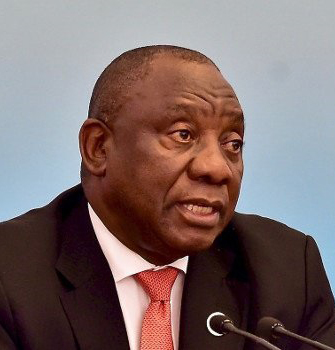JOHANNESBURG, (Reuters) – South African President Cyril Ramaphosa is the “last hope” for Africa’s most advanced economy, but his government must turn incentive policies into laws to secure more Chinese investment, a senior Chinese diplomat told Reuters.
China is South Africa’s largest trading partner and has pledged more investment than any other country since Ramaphosa embarked on a drive last year to attract $100 billion of new investment to lift the economy out of a slump.
While it has attracted some $55 billion in total pledges – including from Saudi Arabia and the United Arab Emirates as well – the drive has so far done little to ease crippling unemployment or boost economic growth.
“President Cyril Ramaphosa is the last hope of this country,” Lin Songtian, China’s ambassador to South Africa, told Reuters.
But while African nations have seen a boom in infrastructure development over the past decade, he said projects proposed by the South African authorities had lacked feasibility studies capable of reassuring the Chinese government and banks of their profitability and sustainability.
Policies of extending incentives, including tax breaks, to attract foreign capital also did not do enough for Chinese investors, who Lin said wanted to see favourable conditions enshrined in an investment law approved by parliament.
“To date there are no major infrastructure projects from China here. Why? Because we don’t only need the concept of a project,” Lin said.
Upgrading South Africa’s antiquated railway network, modernising Durban port and reforming power firm Eskom would also help bring in Chinese money.
The heavily indebted state-owned utility has been forced to implement blackouts as it struggles to meet demand. It has been kept afloat by government bailouts but is regularly cited by ratings agencies as one of the main threats to South Africa’s creditworthiness and economic growth.
China Development Bank agreed to lend Eskom $2.5 billion during President Xi Jinping’s visit to South Africa last year.
“Eskom is a debt trap. China gave them some loans before. And now they become very cautious. … Eskom is not an issue of money. It’s the issue of operation mechanisms, management, capacity,” Lin said.
Earlier this month Ramaphosa came out in defence of Chinese telecommunications giant Huawei, which is helping to bring its 5G technology to South Africa but is a favourite target of U.S. President Donald Trump.
With around 80 percent of the continent’s communications infrastructure already built by Huawei and fellow Chinese firm ZTE, Lin said the kind of pressure the United States was exerting on its European allies not to sign deals with Huawei could never work in Africa.
“This continent is poor, but they are independent. And they will not compromise to the Americans,” said Lin, who previously headed China’s foreign ministry’s African affairs department.
He also shot back at U.S. accusations that Chinese lending for large-scale infrastructure projects was leaving Africa with unsustainable debt.
China agreed to restructure a portion of Congo Republic’s debt, allowing it to secure a bailout from the International Monetary Fund this month.
With number of African countries facing unsustainable debt expected to turn to the IMF for help in the coming years, Congo was seen as a test case for how Beijing would interact with the Fund.
While Lin said China was always open to working with the IMF, he said a boom in African Eurobond issues in recent years was more to blame for the continent’s debt woes.
“If it goes for electricity, roads, industrial parks and follows the concept of intensive development, temporary debt is okay and will be paid back when the country gets developed,” he said.










